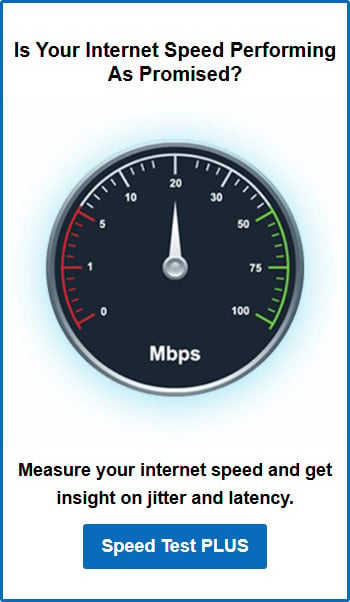What is a Fast Internet Speed?
Posted on January 21, 2019 by Fusion Connect
Businesses today rely on stable and lightning fast business Internet to make all of the pieces fit together.
Payments, data, tracking, PR, customer service, communications — everything hinges on this web of information that needs the Internet to function. So of course we want it to be as fast as possible. We want happy employees who don’t experience any delay. Buffering, lag time, freezing up, and even completely down networks prevent your organization from operating at its best. A “fast Internet” is a connection that allows your business to operate at the peak of efficiency at all times.
But when you start analyzing your Internet speed options, it’s important to understand exactly what goes into creating a fast Internet connection for each business. What’s Mbps and what Mbps is fast? There are a lot of factors involved in making your business Internet robust. Scan through and read up on those you aren’t familiar with.
Broadband
Ethernet, fiber optic cable internet, WiFi, 3G, 4G, 5G, DSL, and cable. A broad (or wide) band of frequencies for sending voice, data, and video on one connection. In simplest terms, it’s everything that is better (high-speed Internet access) than old-school analog connections.
Data Packets
Groups of data that move along the Internet superhighway. They are the cars, but consider that “data loss” means not all of the packets always get to where they are going. It’s like the bumpers, hubcaps, and car door handles you find on the side of the interstate.
Bandwidth
This is the size of your superhighway and determines how many packets (or cars) can travel at once. You want the right number of “lanes” to allow for smooth flow of traffic, but you also don’t want to build a highway that only one or two cars travel down.
Mbps
Megabits per second tells you how much data you are sending through every second. It’s like the devices that count the cars on roads to see if and when more lanes need to be added.
Latency
How long it takes your data packets to reach their final recipient. Just like on a real highway, it can be significantly affected by a lot of Internet traffic and geography or distance.
Routing
The Internet is a large network but it is also a series of individual networks. Internet carriers help connect all of the networks and provide various routes for the data to travel. There are choices (just like deciding which way to drive to Grandma’s house for Thanksgiving) and making changes in routing can help increase your speed. Carriers call these “hops” and the more hops in the routing, the more likely your latency and other quality factors could suffer.
So, What's Considered Fast?
Now that you have a bit of background, what’s fast for 2019?
SpeedTest Global Index is a website that tracks the average download speeds for fixed broadband all over the world.
For the US, the average nears 195 Mbps, well above last years’ average of 138 Mbps and even higher above the global average of 56 Mbps.
To test your own speed, you use Fusion Connects’ Speed Test Plus, which also checks for latency and jitter to see how your speed compares. This test will even keep track of your recent history so you can return anytime to see how it has changed. Keep in mind that the Global Index looks at all tests whether they are for residential or business.
If you have a few employees and don’t have a high demand for streaming or large data downloads, you may be able to select a lower broadband speed to reach your goals. If you have several employees (or hundreds or thousands of them), you will lean more toward the maximum available to deal with data boosts and congestion during high-use periods.
For the highest end users, a full 10 Gbps is available.
To give you an idea of just how fast that is, with just 1 Gbps, you could download a full movie from start to finish in less than a minute. Businesses can also opt for various types of connections for different uses. For instance, fiber optic and dedicated cable are the fastest choices, while shared cable and DSL are slower but can be effective for some types of businesses. The best providers are data and speed architects that design custom connection solutions for all potential use scenarios.
When you contact an ISP (Internet Service Providers) to check on services, they should ask several questions to determine your needs.
- How many users do you have?
- What speed do you currently use?
- How many devices are on the network?
- What types of activities do your employees perform online?
- What automated data activities occur? What are the mission critical areas of your service or product flow that must stay online?
A quality service provider, like Fusion Connect, will cover these questions, and then some. Only then can they determine what a fast Internet speed will be for your business.


